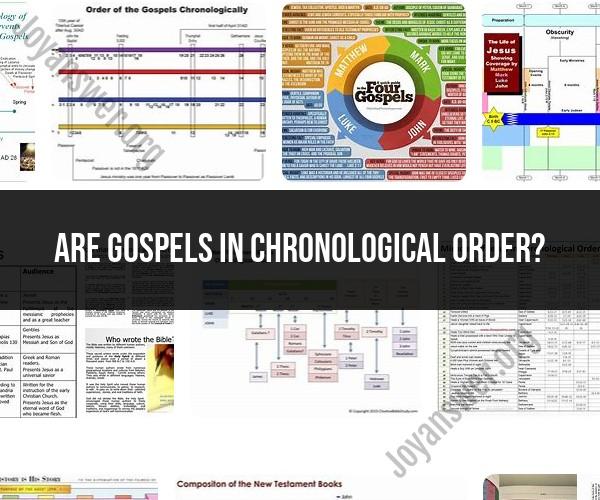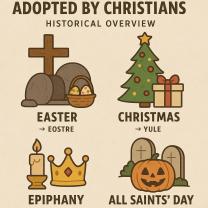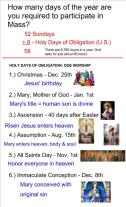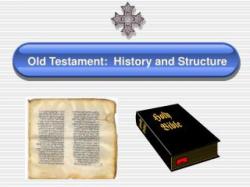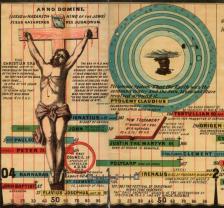Are Gospels in chronological order?
The Gospels in the New Testament of the Bible are not presented in chronological order when it comes to the events they describe. They are organized based on other criteria. The four Gospels in the New Testament are:
Gospel of Matthew: This Gospel is traditionally placed first in the New Testament. It focuses on the life and teachings of Jesus Christ, emphasizing His role as the fulfillment of Old Testament prophecies and the Messiah of the Jewish people.
Gospel of Mark: The Gospel of Mark is typically considered the second Gospel in the New Testament. It is the shortest of the four Gospels and is known for its concise and action-oriented style, highlighting Jesus' miracles and His role as a suffering servant.
Gospel of Luke: The Gospel of Luke comes next in the New Testament. It provides a detailed and comprehensive account of Jesus' life, teachings, and ministry. Luke also wrote the Book of Acts, which follows the Gospel and describes the early history of the Christian church.
Gospel of John: The Gospel of John is the last of the four Gospels in the New Testament. It is known for its theological depth and unique perspective on the life of Jesus, emphasizing His divinity and His role as the Word of God.
The order in which the Gospels appear in the New Testament is not based on the chronological order of the events they describe during Jesus' life. Instead, they are arranged based on factors such as authorship, the audience they were written for, and the theological themes they emphasize.
If you want to explore the life of Jesus in chronological order based on the events, you would need to harmonize the content of the four Gospels and create a chronological timeline of His life and teachings. Various scholars and theologians have attempted to do this, resulting in what is known as a "harmony of the Gospels" or a "Gospel harmonization." These harmonies align the events of Jesus' life as closely as possible in the order they are believed to have occurred.
Gospel Chronology: Ordering the Sacred Texts
Gospel chronology is the study of the chronological order of the events in the four Gospels: Matthew, Mark, Luke, and John. Scholars have been debating the precise order of events for centuries, and there is no one consensus on the matter. However, there are a number of different methods that scholars use to try to reconstruct the chronology of the Gospels.
Exploring the Sequence of Events in the Gospels
One common method of gospel chronology is to compare the synoptic Gospels (Matthew, Mark, and Luke) to each other. These three Gospels share a lot of material in common, but there are also some important differences. By comparing the synoptic Gospels, scholars can try to identify the order of events that they have in common.
Another method of gospel chronology is to use external evidence, such as the writings of Josephus and other historians. Josephus was a Jewish historian who wrote in the first century CE. His writings provide some important information about the events that were happening in Palestine during the time of Jesus.
Theological and Historical Perspectives on Gospel Order
There are a number of different theological and historical perspectives on gospel order. Some scholars believe that the Gospels are meant to be read in chronological order. They argue that the Gospels are not simply historical accounts of Jesus' life, but also theological treatises that are meant to teach us about the importance of Jesus' death and resurrection.
Other scholars believe that the Gospels are not meant to be read in chronological order. They argue that the Gospels are more interested in conveying the theological significance of Jesus' life and ministry than in providing a precise historical account.
Relevance and Impact of Chronological Gospel Studies
Chronological gospel studies can be helpful for understanding the Gospels in a number of ways. First, they can help us to see the Gospels as a unified whole. By understanding the chronological order of events, we can better understand the development of Jesus' ministry and the relationship between the different Gospels.
Second, chronological gospel studies can help us to understand the historical context of the Gospels. By understanding the chronological order of events, we can better understand the challenges that Jesus faced and the impact that his ministry had on the world around him.
Personal Reflections on the Gospels' Chronological Arrangement
Personally, I find that reading the Gospels in chronological order can be a very rewarding experience. It helps me to better understand the development of Jesus' ministry and the relationship between the different Gospels. It also helps me to understand the historical context of the Gospels and the impact that Jesus' ministry had on the world around him.
I would encourage anyone who is interested in studying the Gospels to consider reading them in chronological order. There are a number of different chronological arrangements available online and in print.
